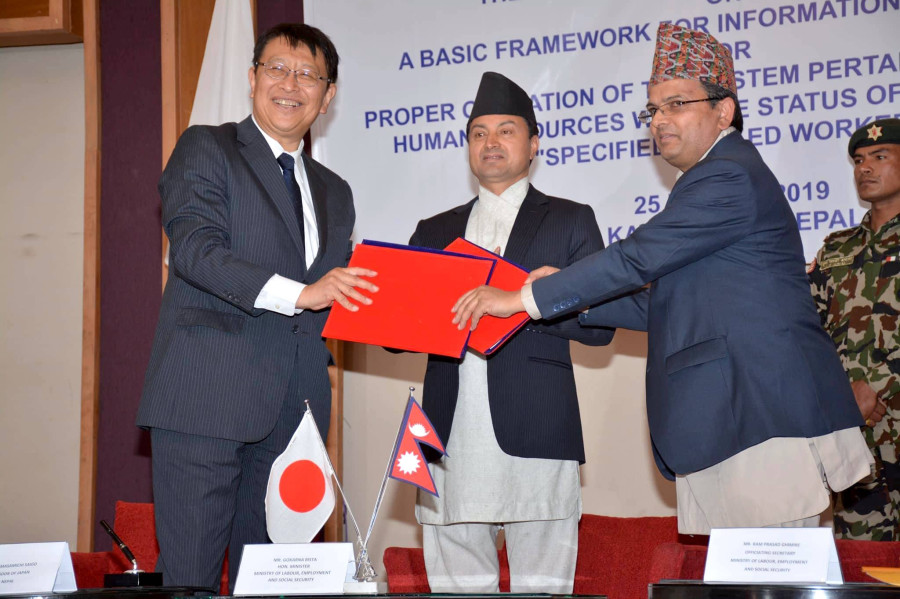National
Nepal yet to send workers to Japan under new deal
Sixteen months after Nepal and Japan signed a labour deal, details on how Nepali workers are to be selected and recruited still remain sketchy.
Chandan Kumar Mandal
More than a year after the Japanese government agreed to provide employment opportunities to Nepali migrant workers, only five dozen job openings have been set aside for Nepali workers.
According to an official at the Ministry of Labour, Employment and Social Security, Japanese employers have demanded around 60 Nepali workers to work as caregivers, the first such job offer for Nepali workers since both countries signed a labour pact in 2019.
“After we received information about the opening, we have been discussing how Nepali workers can be sent to Japan to make use of the opportunity,” said a labour ministry official, who was not authorised to speak to the media.
In March 2019, both countries signed an understanding, on sending Nepali workers with the status of residence of Specified Skilled Workers (SSW) to Japan, formally paving the way for Nepali migrant workers to enter Japan.
However, not much progress has been achieved even months since the signing of the agreement. Thousands of Nepali youths learning Japanese and other skills tests have been waiting for months to live and work in Japan, considered a lucrative job destination country for Nepali workers.
A candidate needs to pass the language and skill test for the respective jobs sector to get a job in Japan.
Tapping on this delay, several private institutes are offering Japanese language courses. Education consultancies and skill-training centres have been advertising through social media and other channels that they shall send workers to Japan under the new deal between the two governments.
In a statement on Friday, the ministry said that its attention has been drawn towards such activities. The ministry has said some firms have not only been advertising their connections with Japanese companies, but also collecting money from prospective workers.
“We have received complaints from individuals about such private firms promising candidates to send Japan as per the understanding between two countries,” said Suman Ghimire, spokesperson for the Labour Ministry. Such malpractices were also reported soon after the deal was signed last year.
As per the understanding between the Japanese and the Nepali governments, private recruiting agencies don’t get to hire and supply Nepali workers. The agreement says that recruitment is to be carried out under a government-to-government (G2G) modality.
According to Ghimire, both countries were preparing to implement the agreement when the Covid-19 pandemic took place.
“A high-level meeting was planned to discuss the procedures, but because of the Covid-19 pandemic, it could not happen,” said Ghimire. “Now, we don’t know how things will move forward as the world economy has changed due to the pandemic. We have to see how demand changes in Japan.”
In 2018, the Japanese government had decided to hire workers from a pool of nine countries including Nepal, the only South Asian nation on the list, to meet its acute shortage of labour force. As per the plan, Japan was to hire an estimated 345,150 workers in 14 sectors over the five years.
As per the agreement, Nepali workers would only be hired for the nursing care sector. But, it’s not clear how many Nepali workers will get employment opportunities in Japan.
“There is an MoU between both the governments, but there are no clear guidelines on how workers will be migrating to Japan. We need a clear selection process,” said the ministry official.
“For example, there are around 60 jobs opportunities but around 75 have passed the language test. It is unclear now how we will select the 60.”
According to the official, the government doesn’t know who passed the Test for Basic Japanese is conducted by the Japan Foundation. The foundation is authorised by the Japanese government to conduct both language and skill tests for aspiring migrant workers.
Meanwhile, the ministry has started working on a set of guidelines on sending Nepali workers to Japan under the government-to-government modality.
“The G2G modality said the Nepal government will send workers. Japanese employers will submit workers’ demands to the Department of Foreign Employment,” said the official, who did not want to be named. “But there are complications as of now. The ministry has been holding discussions with stakeholders on formulating guidelines to send workers to Japan.”




 19.57°C Kathmandu
19.57°C Kathmandu














